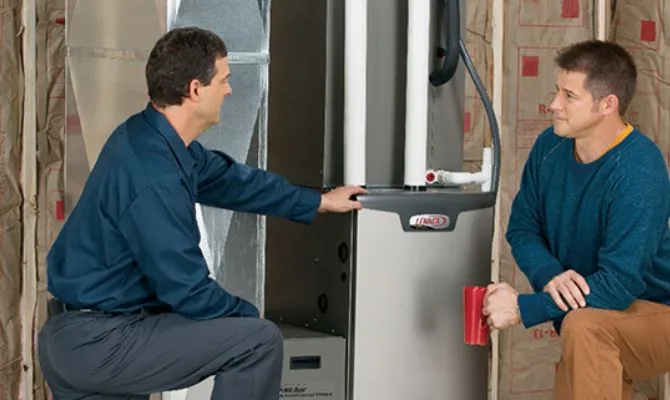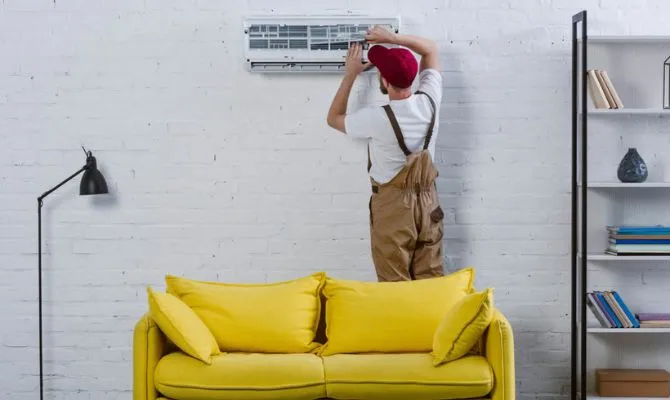If savings on your utility bills makes you smile, you might want to explore the option of installing a heat pump system in your home. These systems are both versatile and efficient and have been proven to work well in the Canadian climate. They can provide both heating and cooling and may also heat hot water. Heat pump systems have also been proven to reduce energy bills significantly. What’s not to like?
How Does a Heat Pump Work?
A heat pump is an electrical device that moves heat from one place (its origin, or source) to another (its target, or sink). Heat has a natural propensity for moving from warm areas to cold areas.
In the summer, the heat pump system uses your home as the source and moves warm air to the outdoors, which becomes the sink. During the winter, the process is reversed. Heat is extracted from the outdoor climate and moved into your home to warm it. This sounds unlikely in a chilly country like Canada, but even in the cold, there is a fair amount of energy that can be extracted and moved indoors.
Air Source vs. Ground Source Heat Pumps
Your system may either use air or the ground as a source for heat. According to Natural Resources Canada, air-source systems are most common here, with more than 700,000 units installed nationwide. However, when the temperature gets very cold, air-source systems aren’t as efficient and you may need a supplemental heating source.
Ground source, or geothermal, systems, require a bit more extra hardware; the systems include a ground heat exchanger that adds or removes thermal energy from the ground.
No matter the source, the pump doesn’t actually generate heat; it simply moves it from one place to another – and it uses renewable thermal energy, making it more sustainable than many other systems.
Its efficiency is derived from the design of the system; it takes less energy (electricity) to pump heat through the system than the amount of energy being moved. For the most efficient use of a heat pump system, the pump must be sized appropriately for your home. The correct size for your heat pump system will depend upon your climate, heating and cooling building loads, and the objectives for installing the system. You’ll want to discuss the choice of system and its sizing with your HVAC professional.
Performance Measures
In evaluating a heat pump system, you’ll want to know how efficient it is at both cooling and heating. Common metrics include the SEER (seasonal energy efficiency ratio) for cooling and the HSPF (heating seasonal performance factor) for heating.
SEER
A SEER is calculated by taking the total cooling provided (measured in Btu) and dividing it by the total amount of electricity used (measured in watts) over the same period. The higher the score, the more efficient the system. In Canada, the minimum rating required is 14.
HSPF
The HSPF is a ratio of how much energy the heat pump provides over a full heating season (in Btu), to the total energy (in Watthours) it uses during the same period. The higher the score, the better; the minimum rating allowed in Canada is 7.1, although this measure varies by region.
Air Source vs. Ground Source Pumps
When installing a heat pump system, you’ll want to consider upfront cost, long-term savings, efficiencies, the space available in your home and noise associated with the system.
Air-source Systems
Air-source systems are cheaper to instal and there are no special requirements for installing one. They can save you about 50 per cent on heating costs compared to an electric furnace, but, as noted above, you may need to turn to a secondary heat source when it gets too cold or when the pump is defrosting.
Ground-source systems
Ground-source systems are generally at least twice as expensive to instal and they require space for the insertion of the ground heat exchanger on your property so the system can draw heat. Here in Canada, they are more efficient than air-source systems, because they work well at very low temperatures.
Compared to electric furnaces, you may save as much as 65 per cent on your utility bill. Either option is more efficient than your standard furnace or boiler. Talk to your HVAC professional for help in evaluating the pros and cons and deciding which system is best for your home.



